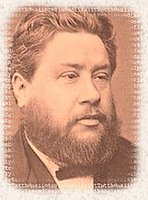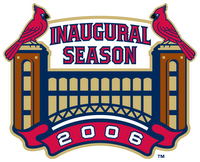
Calvinism ... Why is it such a big deal? Why is it growing in popularity? Why does this frighten and/or frustrate so many, particularly within my SBC circles?
With a
group of pastors & future pastors this weekend, I had the opportunity to discuss the
cover story in the September issue of
Christianity Today magazine, "Young, Restless, Reformed: Calvinism is Making a Comeback--and Shaking up the Church."
Overall I really liked the article. I liked that it identified
John Piper as a leader in the movement's popularity, first because I think it's true and second because I think he goes against the grain of the plethora of straw man arguments and caricatures of Calvinists (e.g.,deceptively describing
hyper-calvinism and putting that description on Calvinists). He is not arrogant. He does evangelize. He's profoundly interested in missions. His Christianity is not an emotionless intellectual orthodoxy. He's passionately consumed with a love for a God who works all things according to His purpose (
Eph 1:11-12). And that inspires people. And that is just biblical Christianity.
Like the English Baptist Prince of Preachers, I agree that Calvinism is just a nickname for the Gospel.

"I have my own private opinion that there is no such thing as preaching Christ and Him crucified, unless we preach what nowadays is called Calvinism. It is a nickname to call it Calvinism; Calvinism is the gospel, and nothing else. I do not believe we can preach the gospel, if we do not preach justification by faith, without works; nor unless we preach the sovereignty of God in His dispensation of grace; nor unless we exalt the electing, unchangeable, eternal, immutable, conquering love of Jehovah; nor do I think we can preach the gospel, unless we base it upon the special and particular redemption of His elect and chosen people which Christ wrought out upon the cross; nor can I comprehend a gospel which lets saints fall away after they are called, and suffers the children of God to be burned in the fires of damnation after having once believed in Jesus. Such a gospel I abhor."
-Charles Haddon Spurgeon,
A Defense of Calvinism
Like that great English evangelist and catalyst of the Great Awakening in America
George Whitefield, I agree that my theology is and should be biblically derived.
"Alas, I never read anything that Calvin wrote; my doctrines I had from Christ and his apostles; I was taught of them by God."
(quoted in Collin Hansen, "Young, Restless, Reformed" (Christianity Today, September 2006), pp.32-38.)
In this way, many don't like the label "Calvinism" as it implies (1) such an understanding of theology originated with Calvin and (2) that such an understanding of theology is dependent of John Calvin.
In the article I liked the representation of the approach that has been labeled "humble orthodoxy" with regard to what we know and how we go about sharing it. In fact, I'm excited our church is a part of a
group of churches putting on a conference about such entitled, "Humble Orthodoxy."
Yet the article notes that there are some, perhaps many, that are not happy about a rise in Reformed Theology.
"Of course there is resistance to the Reform movement in the SBC. But the resistance is not based on any sound biblical/theological arguments. The argument presented in this article was the typical naive assumption that belief in unconditional election leads to laziness in sharing the Gospel. This argument belies crucial problems in the thinking of those who mount it. First of all, to say that belief in the doctrine of unconditional election stifles evangelistic ferver is historically indefensible. The modern missions movement was founded by men like William Carey and David Livingstone (Calvinists!). Moreover, the first great awakening was fueled by the evangelistic preaching of George Whitefield (a Calvinist!). Furthermore, the preacher many church historians consider to be the most prolific evangelist in history, Charles Spurgeon, was a Calvinist. Secondly, the argument betrays a false view of what should motivate us to evangelize. We should not be motivated by our own power, majesty, ability, etc. to convince and convert. We should be motivated by God's power, majesty, and ability to convert souls. He is the one who leads us out to evangelize, so that he might call his sheep into his fold, so that he might be worshipped as God, so that he might be the only one to receive the glory in redemption. He is God!"
-The Rev. M. Jay Bennett (of Providence Church and Solus Christus)
But there are some who are opposed to even a rise in theological discussions of this nature. Some see them as divisive and a waste of time. For
example,
My view is that the current debate over Calvinism in the SBC is not a good thing. It is a distraction, an intramural squabble among people who are suffering from “hardening of the categories.”
Well, I'm a fan of any discussions that will drive people back to the biblical text. I so hope to see us Southern Baptists as people of the book, but too often the books we flock to our "how to" types or the "3 easy steps to ______ (evangelism, growing a megachurch, having a solid marriage, being godly, etc.)."
There is, of course, much to be learned from others in the faith, but I fear we're too reliant on secondary sources. By the way, there's nothing wrong with that, and I encourage the reading therein, but as supplemental reading. And, in case I seemed to suggest otherwise, Calvin himself is a good read. His
Institutes of the Christian Religion are outstanding, very readable, and very pastoral in tone.

But as much as I love reading in the Reformed tradition (e.g., Augustine, Luther, Calvin, Puritans, Edwards, Spurgeon, Packer, Sproul, Piper, etc.), such reading pales to the greatest of Reformers, whose words are found in holy writ. We need not allegiance to a theological system or to a tradition or to an anti-tradition or to our preferences, but to the Word of God and the God of the Word.
But, it concerns me that some will see doctrinal exploration/education in a false dichotomy with "doing" ministry, whether it be evangelism or missions or prayer or whatever. There's often an anti-intellectualism that forgets we are obligated to love God with all our mind also. Note, I say "also," because it's also the heart and our love should show up in obedience (
cf.
John 14:21).
But our actions are impacted by our knowledge the cognitive precedes the behavioral. Our theology should impact our actions. I think it does and is and that's one of the reasons Reformed theology is shedding some of it's detractors.
"I think the criticism of Reformed theology is being silenced by the mission and justice and evangelism and worship and counseling--the whole range of pastoral life. We're not the kind who are off in a Grand Rapids ghetto crossing our t's and dotting our i's and telling the world to get their act together. We're in the New Orleans slums with groups like Desire Street Ministries, raising up black elders through Reformed theology from 9-year-old boys who had no chance."
-John Piper quoted in the Christianity Today article
In many ways the Arminian looks on the Calvinist for the slightest evidence to support a faulty thesis that Calvinism leads necessarily to inactivity or arrogance or apathy, etc. Because of that scrutiny, those who hold to Reformed theology better be at the forefront of reaching out in their communities, sending people to do evangelism, supporting and sending missionaries, and in their passion and affection for God.
Right theology is a right understanding of God and should lead to humility. I'll leave you with one last quote from the article:
"If you really understand Reformed theology, we should all just sit around shaking our heads and going, 'It's unbelievable. Why would God choose any of us?' You are so amazed by grace, you're just crying tears of amazement that should lead to a heart for lost people, that God does indeed save, when he doesn't have to save anybody." -Joshua Harris
Can a brother get an
Amen?
Calvinism ... the word itself makes some men uncomfortable. Could there be a day when the word becomes not a term of terision or dissension, but one of conviction as one is convicted by their missions zeal, love for others, and humble orthodoxy. That was once true historically and I think it can be true again, Deo volente.
Some helpful links:
What should we think of Evangelism and Calvinism by Ernest Reisinger
What we believe about the Five Points of Calvinsm (by
Bethlehem Baptist in MN)
From the Protestant Reformation to the Southern Baptist Convention: What Hath Geneva To Do with Nashville? by
Thomas K. Ascol
 So, I got to go to the Cardinals game tonight at the NEW Busch Stadium.
So, I got to go to the Cardinals game tonight at the NEW Busch Stadium. tonight, just the sting of getting decisively beaten. I knew we were in trouble when the Cardinals were down 8-0 after 2.5 innings. Only the postgame White Castles brought any consolation.
tonight, just the sting of getting decisively beaten. I knew we were in trouble when the Cardinals were down 8-0 after 2.5 innings. Only the postgame White Castles brought any consolation.

 AND they won the World Series!
AND they won the World Series!





























